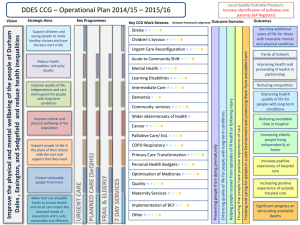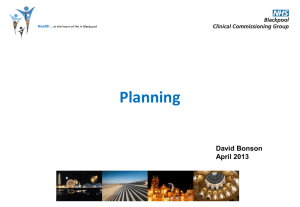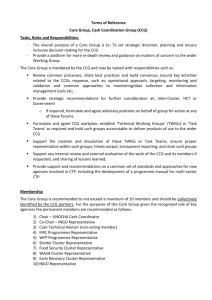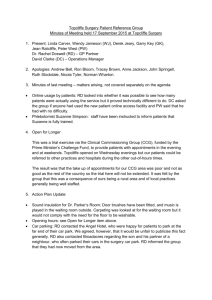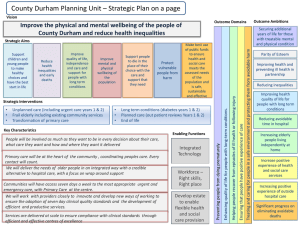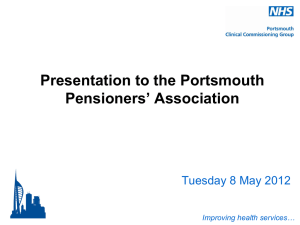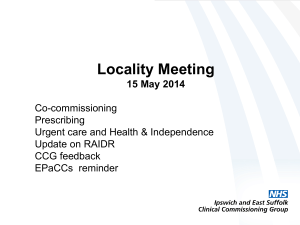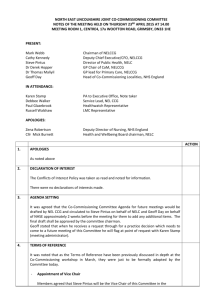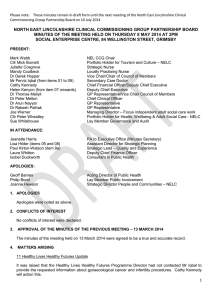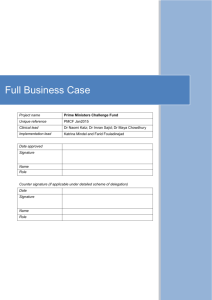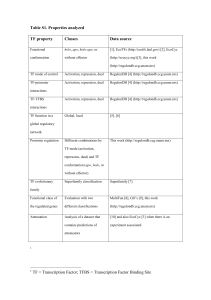item-6-2015_07_23-jcc-7-day-pilot
advertisement
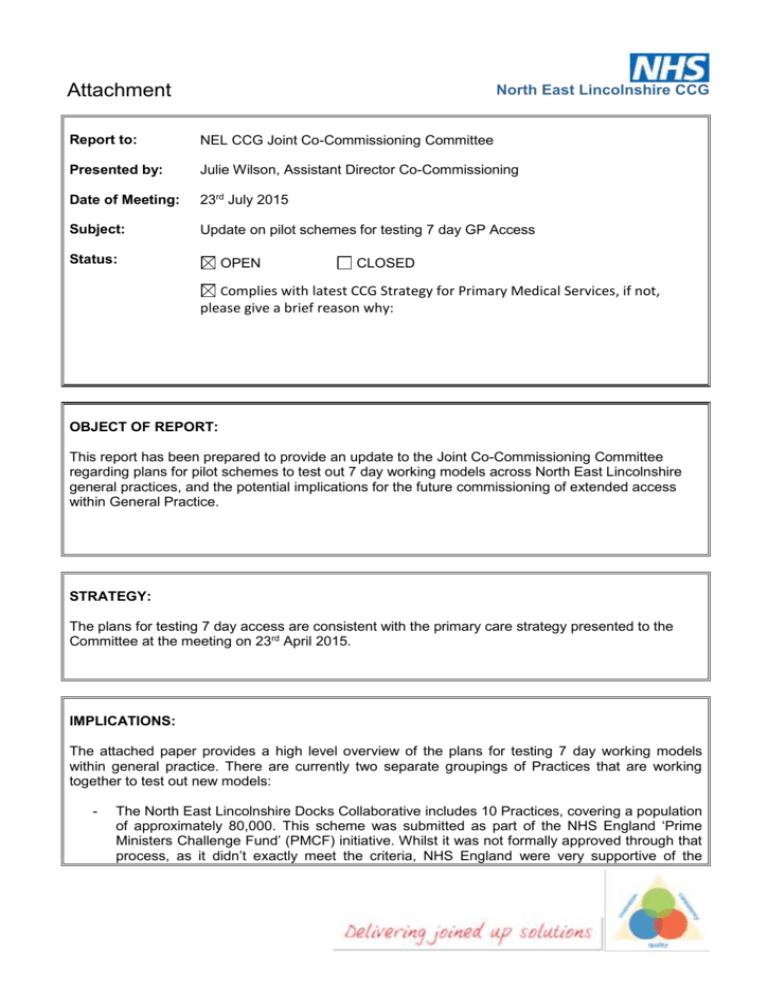
Attachment North East Lincolnshire CCG Report to: NEL CCG Joint Co-Commissioning Committee Presented by: Julie Wilson, Assistant Director Co-Commissioning Date of Meeting: 23rd July 2015 Subject: Update on pilot schemes for testing 7 day GP Access Status: OPEN CLOSED Complies with latest CCG Strategy for Primary Medical Services, if not, please give a brief reason why: OBJECT OF REPORT: This report has been prepared to provide an update to the Joint Co-Commissioning Committee regarding plans for pilot schemes to test out 7 day working models across North East Lincolnshire general practices, and the potential implications for the future commissioning of extended access within General Practice. STRATEGY: The plans for testing 7 day access are consistent with the primary care strategy presented to the Committee at the meeting on 23rd April 2015. IMPLICATIONS: The attached paper provides a high level overview of the plans for testing 7 day working models within general practice. There are currently two separate groupings of Practices that are working together to test out new models: - The North East Lincolnshire Docks Collaborative includes 10 Practices, covering a population of approximately 80,000. This scheme was submitted as part of the NHS England ‘Prime Ministers Challenge Fund’ (PMCF) initiative. Whilst it was not formally approved through that process, as it didn’t exactly meet the criteria, NHS England were very supportive of the - proposal and agreed to fund it from the national primary care infrastructure fund. The Grimsby Central GP Collaborative includes 12 Practices, covering a population of approximately 70,000. This is in response to a CCG offer to fund a pilot from within 2015/16 non-recurrent transformational funding. The group are currently developing their model, and have submitted an initial high level proposal to the CCG. The plan is to have a final model agreed by the end of July, for implementation by 1st October 2015. The attached paper – Appendix 1 – sets out some of the key features of the two test models. It is important to note that both of the pilots are at an early stage and communication and engagement plans for the registered population will be a key part of the work. These plans are being developed. Once the evaluation of the 7 day pilots is available, within the final quarter of 2015/16, this Committee will be presented with the findings and asked to take a view on how the current commissioning arrangements for extended GP access could be reviewed to support a new model, should it prove successful. RECOMMENDATIONS (R) AND ACTIONS (A) FOR AGREEMENT: The Joint Co-Commissioning Committee is asked to note the plans for testing 7 day access, and the potential impact on future commissioning arrangements for extended GP access. Yes/ Comments No Does the document take account of and meet the requirements of the following: i) Mental Capacity Act N This will be considered as services develop ii) CCG Equality Impact Assessment N A full equality impact assessment will be undertaken for each service iii) Human Rights Act 1998 N This will be considered as services develop iv) Health and Safety at Work Act 1974 N This will be considered as services develop v) Freedom of Information Act 2000 / Data Protection Act 1998 Y iv) Does the report have regard of the principles and values of the NHS Constitution? Y www.dh.gov.uk/en/Publicationsandstatistics/Publications/Publica tionsPolicyAndGuidance/DH_113613 Appendix 1 Testing models for 7 day working with General Practice: Key Features [N.B.: Comms and engagement plans with registered patients will be developed prior to changes taking place] North East Lincolnshire Docks Collaborative The current proposal is as follows: Based on the evidence gathered we are looking to introduce a centralised triage service. The service will be GP led, placing a senior clinical decision maker at the ‘front door’ ensuring patients are managed by the right person in the right place at the right time. The proposed model would be delivered as follows: The proposed implementation of the above model would offer patients: Timely triage from a GP (target 30 mins) to determine the most appropriate service to manage the presentation including: Advice / Reassurance (no appointment requirement) Sign posting to alternative support services Urgent Appointment: In hours - within registered practice or at an alternative practice involved in the trial if no appointments are available Out of hours – an appointment is made within the GP out of hours service Routine Appointment (redirected to Patient Partner) Urgent Visit (supported by the ‘mobile GP’, a concept currently being trialed by CCL to increase primary care capacity) Routine Visit A&E – liaison with A&E GP service (provided by CCL) will ensure the patients care is coordinated / fast tracked and where possible, patients don’t enter the A&E system unnecessarily 999 24/7 access to book, cancel and rearrange routine appointments Centralised service for the processing of repeat prescriptions The above model would be available Monday – Friday, 8am – 8pm and Saturday and Sunday, 8am – 12pm. This approach would offer improved extended access to services, in line with the feedback received via the local survey. All services provided by the practices and Core Care Links operate using SystmOne. This interoperability supports the central triage service being able to access patient records and book appointments. It also enables instant communication with the additional services detailed in the bid, ensuring seamless, coordinated care One of the predicted outcomes of the implementation of the model is the reduction in the requirement for face to face consultations. Although not a benefit / outcome included within this bid, the providers involved in the proposal are committed to use this freed up capacity to develop a specialist service across the practices to support the management of patients with Long Term Conditions (LTCs), specifically those that are poorly controlled. This will be achieved through: Ability to provide longer consultations Development of a specialist team to work across all practices, providing ‘wrap around’ services for patients with multiple LTCs Establish ‘one stop shop’ clinics in the community for patients with LTCs, including working with secondary care consultants in the community. Promoting continuity of care, improving overall quality and productivity of local services and reducing health inequalities. Docks Collaborative are looking for the opportunity to ‘prove the concept’ of a centralised triage service. We would then look to work with NHS England and the CCG to help them to determine how best to roll out the learning and implement if successful across the whole area, and support practices outside of the CCG to utilise our learning for the benefit of their patient population. Grimsby Central GP Collaborative: The proposal for this group of Practices is still in development (full proposal is due to be completed by the end of July). The criteria that have been developed by the CCG, which this proposal will be seeking to address, are as follows: To be supported by the CCG the pilot must demonstrate how it will meet all of the following criteria (which reflect those required in the Prime Ministers Challenge Fund). 1. Improved access This must include: longer opening hours, as a minimum 8am-8pm weekdays and opening on weekends and bank holidays; joining-up of urgent care and out-of-hours care; greater flexibility about how people access general practice; greater use of technology to provide alternatives to face-to-face consultations e.g. via phone, email, webcam and instant messaging; greater use of patient online services more innovative ways for people to access and relate to general practice, including for children and young people and from groups that find it hard to access general practice Other improvement such as greater use of telecare and healthy living apps to help people manage their health without having to visit their GP surgery as often, would also be welcomed.. 2. Improved patient experience Practices must also be able to demonstrate how the pilot responds to local patient insight, preferences and priorities, with a clear goal of improving patient experience of access e.g. as measured through the GP Patient Survey. 3. Integration with local plans & priorities for out of hospital care by demonstrating a more integrated approach to providing general practice and wider out-of-hospital services, including ‘wrap-around’ community services such as community pharmacy, diagnostic services and voluntary sector provision; Access to senior clinical decision maker as first point of contact for urgent requests; Extended access for both routine and urgent appointments across general practices (with appropriate governance arrangements); For routine appointments, use of technology for booking appointments and ordering repeat prescriptions; Ability for despatch of GP for urgent home visit (within 1 hour) where assessed as clinically required. 4. Sustainability beyond the life of the pilot scheme in terms of: recurrent financial costs clear, credible plans for delivering benefits to patients on an ongoing basis beyond the lifetime of the pilots 5. Good governance including: strong leadership and commitment/buy-in from all practices involved minimum scale of a population of 30,000 project management arrangement and project plan that demonstrates how implementation can be achieved by 1st October 2015 telephony and IT capability SMART performance measures and improvement targets Performance management and evaluation arrangements capability to be rolled out to other local practices not covered by either this or the PMCF pilot operating in NEL

